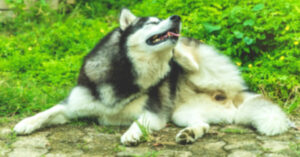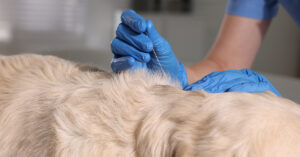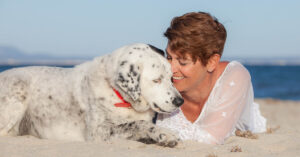Springtime is in full swing and many of us are feeling the familiar running nose, itchy eyes and sinus congestion as nature provides us with all the color and new growth.
Sometimes, pet owners are surprised to find out that their dog or cat can have pet allergies as well. Pets can be allergic to a broad range of allergens including airborne, contact, food allergies, and last but not least, flea allergy. This article deals with the more typical springtime allergies, but it is important to identify all potential pet allergies. We will discuss those allergies in future articles.
The airborne allergies don’t always present in the same way that we might show ours, but here are some signs to watch for.
Dog Allergies
If a dog has an allergic response to the airborne allergens, there are some key features we look for. The history can be very helpful in that many airborne allergens tend to have seasonal patterns such as spring and fall. The most common complaint associated with allergies in dogs is itching which may present itself with scratching, biting at themselves or licking areas persistently. There are a few areas which seem to be affected more often and would include ear itching, face rubbing and foot licking.
These signs are not the only areas that may be affected and other pet allergies can have similar signs. This is why the history can be so helpful if someone says that their pet only has these signs in the spring, or if they notice that they are noticeably more itchy after going outside. Some dogs will show some respiratory signs with their allergies and might include runny eyes and nose, sneezing and the dreaded “reverse sneeze”! It is important to relate all of the history to your veterinarian as certain medications have more effect on itching versus respiratory signs.
The treatments can be very similar to what may be used in people. They can range from antihistimines and cortisone type compounds to special baths and topical treatments. Sometimes more severe cases have to be referred to a specialist that can do skin testing to identify allergens and develop an allergy injection to be given at home. Each case can present a little differently so there is no one-size-fits-all treatment. The important thing is to recognize that your pet may be showing pet allergies, and to take them to your veterinarian to have them examined and discuss the options for treatment.
Cat Allergies
Cats that have airborne or inhalant allergies will usually present in a much different way than a dog with allergies. The history can be helpful if it has been more of a seasonal problem.
Cats will rarely scratch at themselves as a dog will but licking or excess grooming is the most common sign. I have had clients swear that their cat was not itching but complained about the amount of grooming they were doing and more frequent occurrence of hairballs being thrown up around the house!
Cats will suffer some pet allergens so much that they will groom themselves to the point of removing large areas of hair and will almost look like they’ve been shaved. Cats can also develop small crusty bumps, usually around their neck, rump or abdomen. The term for this is called “Miliary dermatitis” because it can look like little seeds on the skin. Cats are also very sensitive to flea bites and may have food allergies as well. Once again, it is important to get a thorough history and complete physical exam.
Spring is a great time of year that reminds us of the beauty and wonder of nature. Make sure you pet enjoys this time of year as well by being aware of their comfort and condition. Make an appointment with us if you think your pet is suffering with some allergic signs. You will both be glad you did!



